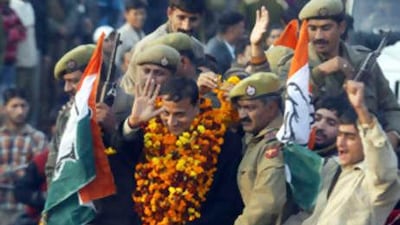SRINAGAR, INDIA // Political parties in Indian Kashmir are trying to stitch together a coalition after recent elections. The results have been seen as a vote for better governance in the disputed region rather than acceptance of Indian rule. The National Conference, the region's single largest party, said it would talk to the Congress party, which heads India's ruling coalition, on a possible alliance. No clear winner emerged at the end of a month-long, seven-phase poll.
"We will formally approach Congress for the formation of the government," National Conference president Omar Abdullah told reporters. Mr Abdullah's party won 28 of the assembly's 87 seats, the Congress 17, the regional People's Democratic Party 21, Bharatiya Janata Party 11 and other parties and independents won 10 seats. Despite a boycott call by separatists and Muslim militants, the election had a turnout of more than 60 percent of Kashmir's 6.4 million voters.
The National Conference and People's Democratic Party strongly back greater autonomy for the region to help end a two-decade separatist rebellion. The Congress party believes Kashmir is an integral part of India. The large voter turnout has encouraged New Delhi, which now hopes to blunt separatist sentiments and bring peace by investing heavily in development projects and job creation. "The high voter turnout is a clear victory of the large majority who wish the restoration of peace and normalcy," N.N. Vohra, the governor of the Jammu and Kashmir state, said in a statement.
Separatists saw the high voter turnout as a desire to choose a good government that can build roads and improve civic amenities and did not believe that undermined the independence movement. "Undoubtedly people voted, but they voted for water, electricity and employment, not for Indian rule," senior separatist leader Syed Ali Shah Geelani said. "The freedom struggle will go on until it reaches its logical conclusion."
* Reuters

